Safe Custody
Safe Custody
With a view to protecting the public and preventing crime for a better Hong Kong, the Correctional Services Department (CSD) is committed to ensuring a secure, safe, humane, decent and healthy custodial environment. Keeping good discipline and order in correctional institutions while maintaining a stable and harmonious custodial environment at the same time is by no means easy. In face of the raging COVID-19 epidemic and black-clad violence which have added burden and difficulties to the CSD, correctional officers have remained steadfast in duties and risen to the challenges courageously. Through upgrades in its institutional facilities and development of smart prison projects, the CSD has managed to keep ensuring the stability of correctional institutions amid the challenging times, thereby enabling Hong Kong to remain one of the safest cities in the world.
Penal Population
Male Persons in Custody
The CSD operates 9 correctional institutions for adult male persons in custody. Lai Chi Kok Reception Centre accommodates persons awaiting trial and newly-convicted persons pending classification and allocation to appropriate correctional institutions. Adult persons in custody on long-term sentences, including life imprisonment, are accommodated in maximum-security Stanley Prison or Shek Pik Prison. Tong Fuk Correctional Institution, Hei Ling Chau Correctional Institution and Pak Sha Wan Correctional Institution are medium-security institutions for accommodating adult male persons in custody. There are 3 minimum-security institutions, namely Tung Tau Correctional Institution, Pik Uk Prison and Tai Lam Correctional Institution. Elderly persons in custody of low security risk (normally aged over 65) are accommodated in Tai Lam Correctional Institution. Pik Uk Correctional Institution, a maximum-security institution, accommodates young males under the age of 21 who are sentenced to imprisonment or remanded in custody.
In 2021, a total of 5 522 adult males were sentenced to imprisonment and 4 679 remanded in our custody. There were 97 young men under the age of 21 sentenced to imprisonment and 608 remanded in our custody.
Female Persons in Custody
Tai Lam Centre for Women is a maximum-security institution functioning as a remand centre and a prison for adult women. Lo Wu Correctional Institution is an institution for female adults, with 1 minimum-security wing and 2 medium-security wings. Young females under the age of 21, who are sentenced to imprisonment or remanded in custody, are all accommodated in Lai King Correctional Institution.
In 2021, a total of 1 989 adult females were sentenced to imprisonment and 1 368 remanded in our custody. A total of 17 young women under the age of 21 were sentenced to imprisonment and 91 remanded in our custody.
Training Centres
In accordance with the Training Centres Ordinance, young persons in custody are required to undergo training for a period ranging from 6 months to 3 years. The training is designed having regard to individual persons in custody whose training progress would affect the timing of their release. Qualified teachers with relevant experience will conduct education and vocational training classes whereas qualified instructors will regularly organise recreational activities for young persons in custody. Young male and female persons in custody sentenced to these centres receive training in Pik Uk Correctional Institution and Lai King Correctional Institution respectively.
In 2021, 59 male and 3 female young persons in custody were admitted to the centres.
Detention Centre
Sha Tsui Correctional Institution accommodates young male detainees and offers them a training programme which emphasises strict discipline, hard work and psychological counselling. Detainees aged 14 to under 21 will be detained for 1 to 6 months whereas those aged 21 to under 25 will be detained for 3 to 12 months. A total of 82 young detainees under the age of 21 and 8 young adults aged 21 to under 25 were admitted in 2021.
Rehabilitation Centres
Rehabilitation Centres provide training for young persons in custody in need of a short-term rehabilitation programme, which focuses on reshaping these youngsters. The programme consists of 2 phases with a total period of detention ranging from 3 to 9 months. In the initial detention period, all young persons in custody are required to undergo education and vocational training. In the subsequent residence period, all young persons in custody, after studying, working or engaging in approved activities, are required to reside in the Rehabilitation Centres. Young male persons in custody will reside in either Lai Chi Rehabilitation Centre or Lai Hang Rehabilitation Centre whereas young female persons in custody will reside in either Chi Lan Rehabilitation Centre or Wai Lan Rehabilitation Centre. A total of 113 male and 19 female young persons in custody were admitted in 2021.
Drug Addiction Treatment Centres
Hei Ling Chau Addiction Treatment Centre accommodates adult male drug abusers while Lai Sun Correctional Institution accommodates both adult and young male drug abusers. Nei Kwu Correctional Institution and Lai King Correctional Institution accommodate adult and young female drug abusers respectively. Treatment lasts from 2 to 12 months through work and therapy to rid individuals of drug dependence and correct criminal behaviour.
In 2021, 464 adult persons in custody and 61 young persons in custody were admitted to the drug addiction treatment centres. Among them, 444 were males and 81 were females.
Staying Vigilant against Long-running Epidemic
Although the local COVID-19 epidemic continued in 2021, all correctional officers remained vigilant and committed to duties with a view to maintaining a secure safety net for the custodial environment.
In addition to the continual application of advanced anti-epidemic technologies and equipment to frequently disinfect and cleanse premises under the charge of CSD, the institutional management also kept taking a series of anti-epidemic measures, including conducting virus testing on persons in custody upon admission and arranging for them to undergo isolation and observation, in order to reduce the risk of transmitting the virus and safeguard the health of staff and persons in custody.
To support the Government’s appeal, the Department encouraged and arranged for correctional officers to receive COVID-19 vaccination to protect themselves and others. As at 31 December 2021, over 98 per cent of correctional officers got vaccinated. Besides, the Department has launched a voluntary vaccination programme for persons in custody since July 2021, under which persons in custody are arranged to be vaccinated in a timely manner according to their wishes.
With concerted efforts of all parties concerned, no persons in custody or correctional staff in correctional institutions tested positive for COVID-19 in 2021, which was a remarkable achievement.
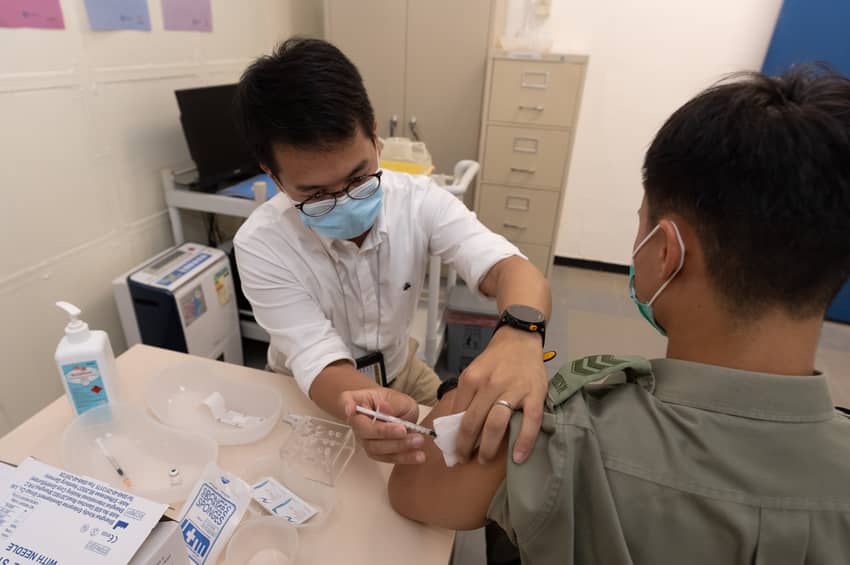
Outreach teams formed by professionally trained correctional officers provide vaccination service to correctional officers at different institutions.
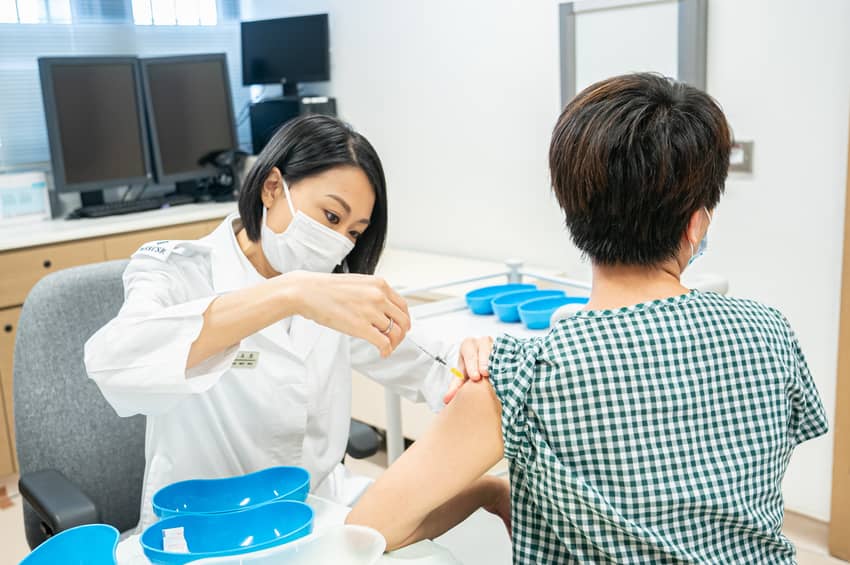
The Department has launched a voluntary vaccination programme for persons in custody since July 2021, under which persons in custody are arranged to be vaccinated in a timely manner according to their wishes.
Rising to Challenges Arising from Black-clad Violence
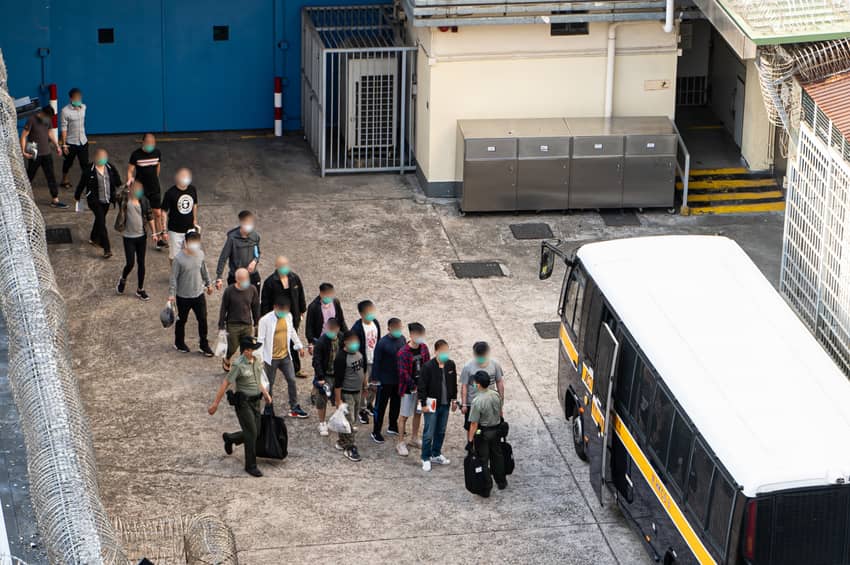
Remands are being escorted by correctional officers.
Upon the promulgation of the Hong Kong National Security Law on 30 June 2020, the social turmoil has come an end and Hong Kong has gradually resumed normal and returned to the right track of development. However, the Judiciary has since then processed backlog cases resulted from the suspension of court hearings in full swing amid the on-going epidemic, more and more people who were involved in black-clad violence or violated the Hong Kong National Security Law have been remanded or sentenced, resulting in a rising penal population. The annual number of new admissions (including convicted persons, remands and detainees) increased from 11 967 in 2020 to 15 311 in 2021, representing an increase of 28 per cent. The average daily penal population at correctional facilities also increased by 10 per cent from 6 902 persons in 2020 to 7 616 persons in 2021. The average daily number of remands hit a decade high, from 1 388 in 2012 to 2 316 in 2021, representing an increase of 67 per cent. Keeping a close eye on the situation, the Department planned ahead and deployed resources having regard to the actual operational needs. For example, in mid-2021, some of the male remands were transferred to Tung Tau Correctional Institution in order to ease the overcrowding issue of and pressure on Lai Chi Kok Reception Centre and Stanley Prison.
In 2021, there were a total of 985 admissions to correctional institutions which got involved in offences under the Hong Kong National Security Law and riot-related offences, an increase of 133 per cent from 422 persons in 2020. Some of them are radicals or highly educated people who attempted to use their influence to build up forces against the institutional management, posing threats to institutional order and discipline. To tackle these threats and challenges, the Department has adopted a “pre-emptive” strategy to prevent such issues from brewing and fermenting. In addition to enhancing the intelligence network and monitoring system, persons in custody were assigned to different correctional institutions according to their backgrounds, offences and influence under the established mechanism so as to prevent them from building up forces. If persons in custody are found to have committed acts of indiscipline, challenged institutional management through different means, or even endangered national security, correctional officers will take actions in the first instance and the Regional Response Team (RRT) will then be called in to render support, with a view to maintaining institutional order and discipline. The Department has been guarding the last line of defence and will never allow any correctional institutions to become bases for subversion against China and Hong Kong. In 2021, RRT was deployed to carry out 5 large-scale operations against illicit activities by persons in custody at Tung Tau Correctional Institution, Lo Wu Correctional Institution, Tai Tam Gap Correctional Institution (twice) and Lai Chi Kok Reception Centre in order to ensure a secure and safe custodial environment.
Besides, some of the above-mentioned persons in custody colluded with outside parties and made collective effort in an organised manner to smear the correctional system and various aspects of prison life. For instance, they urged the CSD to improve the hot environment and air ventilation of correctional institutions, and accused the Department of exploiting the rights of persons in custody to official visits and to receiving handed-in articles in an attempt to alter the penal operations, deter correctional officers from taking actions, undermine the deterrent effect of imprisonment and hence affect the overall stability and safety of Hong Kong. Despite these unfounded accusations and the pressure imposed, correctional officers continued to hold fast to their posts fearlessly, uphold the principles and values, remain determined to carry out the monitoring work in accordance with the law.
The Department also attaches equal importance to the concealment of contraband and underhand deals by persons in custody as it is common for them to establish relationships through sharing of items, leading to the speedy building up of forces within the enclosed environment of institutions, and hence posing threats to institutional discipline and order. The Department made its utmost effort to combat the concealment of contraband last year. As a result, the number of disciplinary charges against persons in custody, which resulted in punishment, for unauthorised possession of articles rose from 1 211 in 2020 to 1 441 in 2021, representing an increase of 19 per cent.
The Department has been actively taking different measures to combat any forms of illicit acts within institutions, and to prevent outside groups from persuading persons in custody to maintain their radical thoughts, spreading to them information endangering national security and building up forces inside correctional institutions against the management through different means. For example, the institutional management is empowered by law to search and read letters sent to or from persons in custody. If it is found that the contents of a letter may pose possible threats to institutional security, or a letter contains messages endangering national security, or a person in custody deliberately tries to send out a letter to give messages or instructions to outsiders, such letters will be withheld according to the law. The Department will remain steadfast in its role as the last element of the criminal justice system and will never allow any institutions to become a base for subversion against China and Hong Kong.
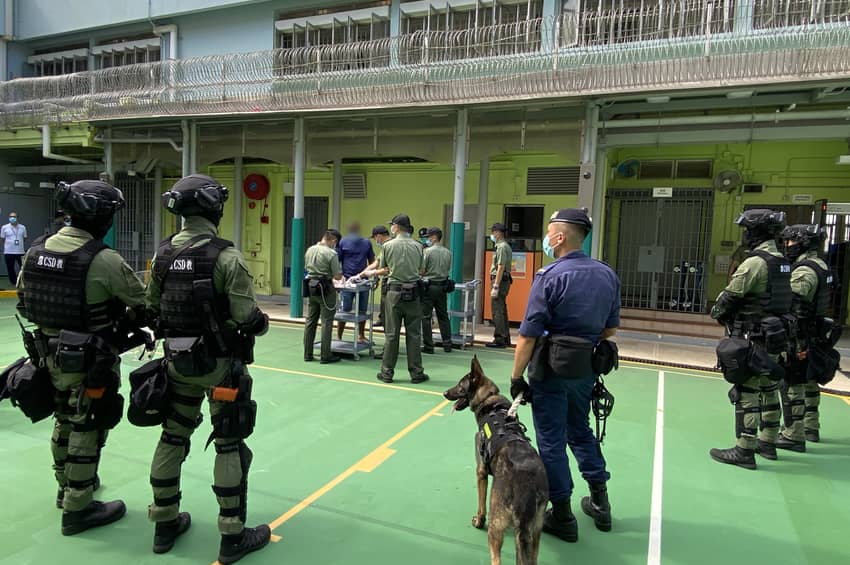
The RRT, Dog Unit and other support teams render support to the management of Tai Tam Gap Correctional Institution in combating illicit collective acts by detainees.
Smart Prison – Tai Tam Gap Correctional Institution
The Department has been actively developing the “Smart Prison” protocol since 2018. Various technology projects have been rolled out in a number of correctional institutions under 4 major system categories for strategic development, namely the Security and Monitoring System, the Operation and Management System, the Persons in Custody Self-management System and the Staff Capacity Enhancement System, with a view to enhancing the efficiency of prison management, the level of security and the effectiveness of rehabilitation programmes.
Thanks to the experience gained from the trial runs of technology projects over the past 2 years, the Department has been making modifications, introducing new elements and conducting system integration so as to convert Tai Tam Gap Correctional Institution into the first-generation Smart Prison. Having come into operation again in May 2021, Tai Tam Gap Correctional Institution serves as a minimum-security correctional institution for detention of male adult detainees under the Immigration Ordinance. Between May and December 2021, a total of 131 detainees were admitted to Tai Tam Gap Correctional Institution.
The integration of various technology projects into the daily management and security aspects of Tai Tam Gap Correctional Institution enhances operational efficiency and promotes humanised management, thereby providing a safer, more secure and harmonious custodial environment. Moreover, various systems are interlinked to form a comprehensive data and security monitoring network, which facilitates the extensive implementation of the “unit management” monitoring mode, thereby strengthening teamwork among colleagues and allowing more flexible staff deployment.
The operation of Tai Tam Gap Correctional Institution has provided valuable experience and laid a solid foundation for the long-term development of “Smart Prison” in the future. The Department will continue to actively explore and implement different technology projects, under which smart elements will continue to be introduced to modernise facilities, and a humanised management mode will be adopted to improve the working environment of correctional staff and reduce the burdensome and labour-intensive daily work procedures, so as to enhance the operational efficiency and level of security of correctional institutions.
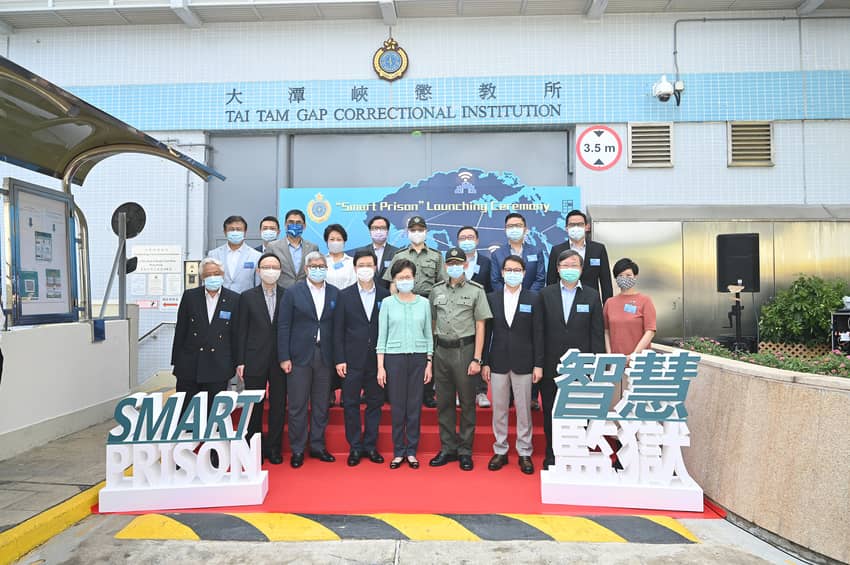
Opening ceremony of the Smart Prison
Five of the systems implemented in the first-generation Smart Prison:
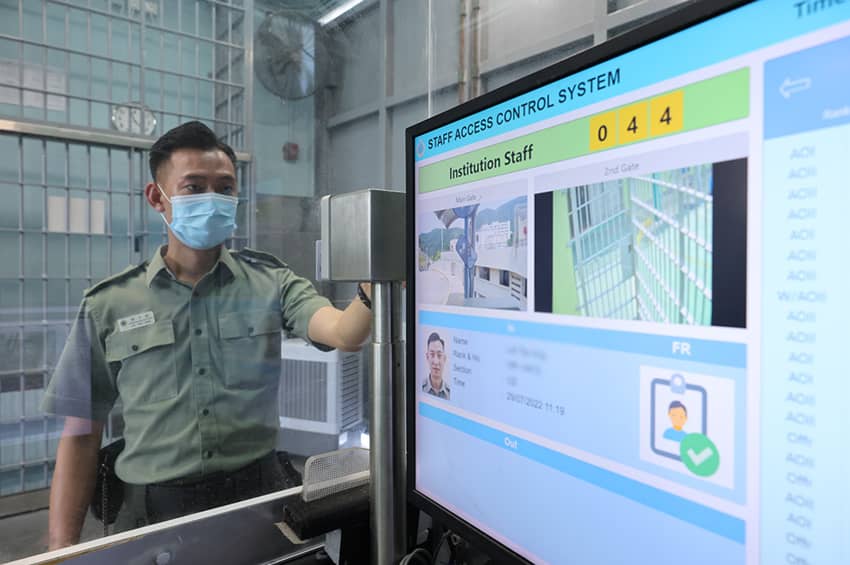
Staff Access Control System
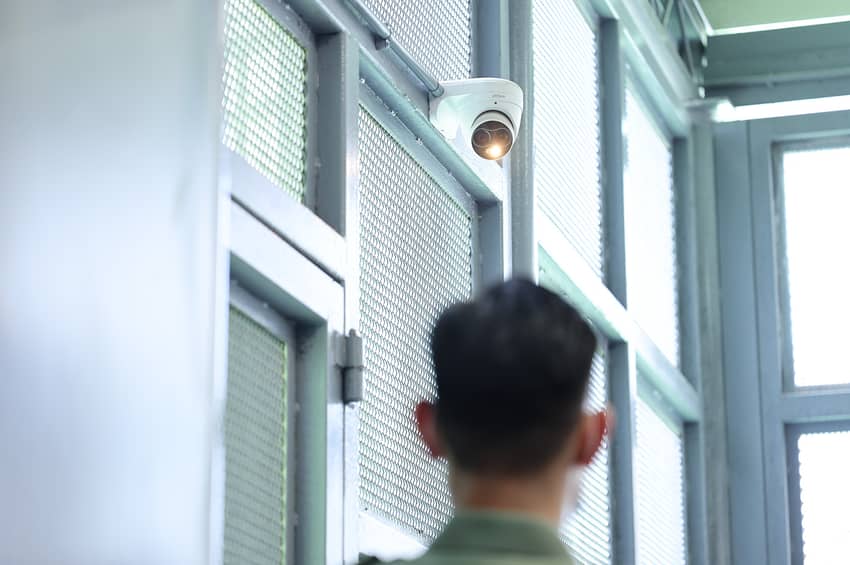
Centralised Body Temperature Detection System
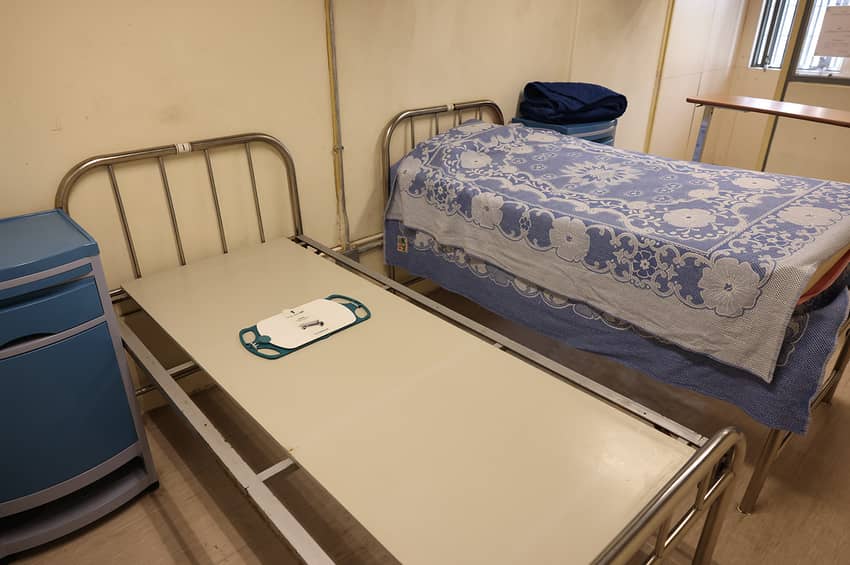
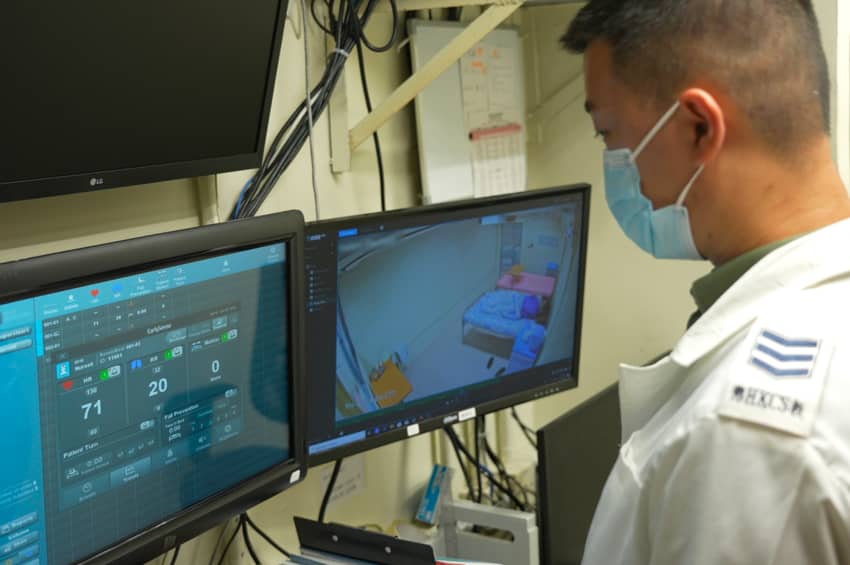
Smart Health Sensing System
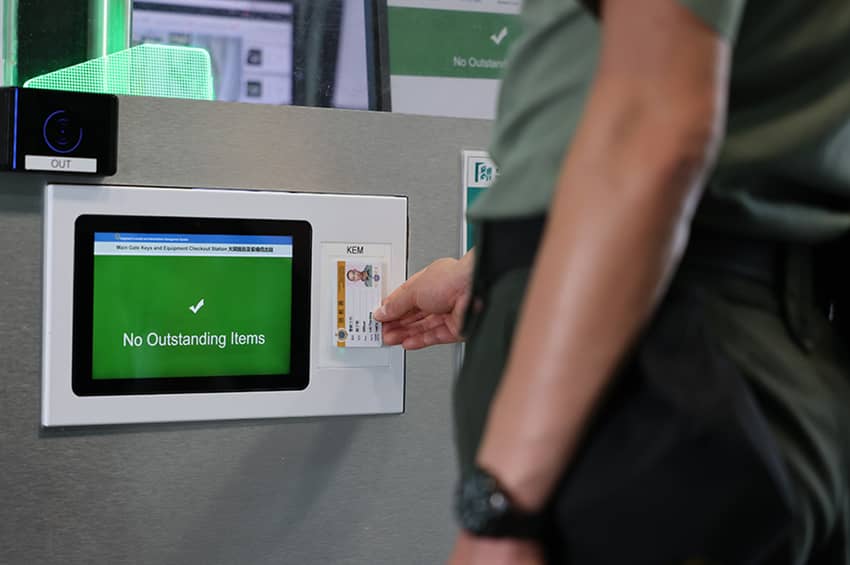
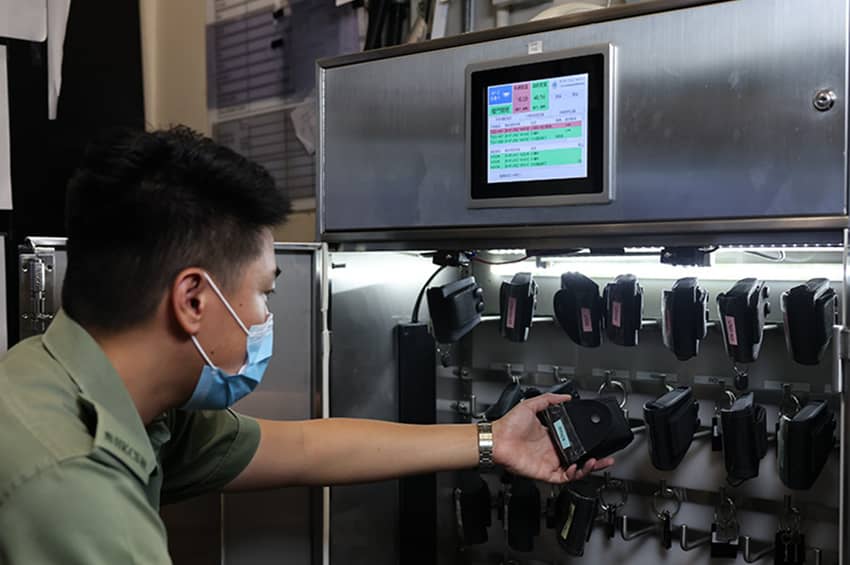
Keys and Equipment Management System and Smart Handcuff Cabinet
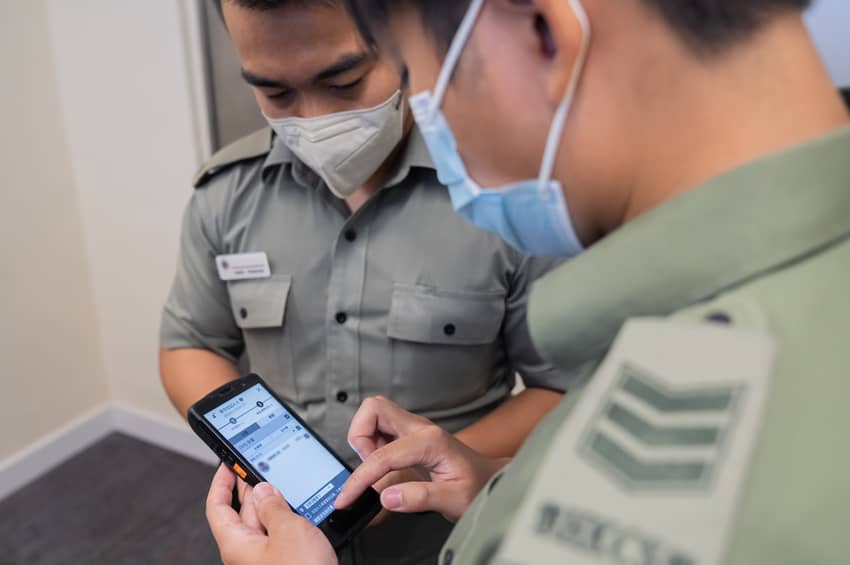
Staff Handheld Device System
Apart from proactively developing the first-generation Smart Prison, the Department continues to introduce technology projects of various categories for trial runs in different institutions so as to promote the modernisation of correctional facilities. The Department also strives to enhance the efficiency of custodial operations and the level of security through the application of technology and process optimisation. Besides, persons in custody are allowed to manage their personal matters with the use of technological systems, thereby enhancing their self-management ability and facilitating their re-integration into the society. Through collaboration with different stakeholders such as the Electrical and Mechanical Services Department, the Architectural Services Department and the Office of the Government Chief Information Officer, the CSD has achieved fruitful results in different fields including video analytic monitoring, health sign monitoring and robotic application, etc.
As phased results have been achieved in the development of “Smart Prison 1.0”, the CSD will conduct preliminary research and planning for the development of “Smart Prison 2.0”. The Department is actively reviewing the experience and effectiveness of various projects of “Smart Prison 1.0” so as to continue to introduce more suitable and innovative smart prison projects in different correctional institutions, aiming at setting up a management mode led by “big data” for prison management. In the future, the CSD will also proactively seize the opportunity of redeveloping correctional institutions to apply the “Smart Prison 2.0” concept comprehensively.
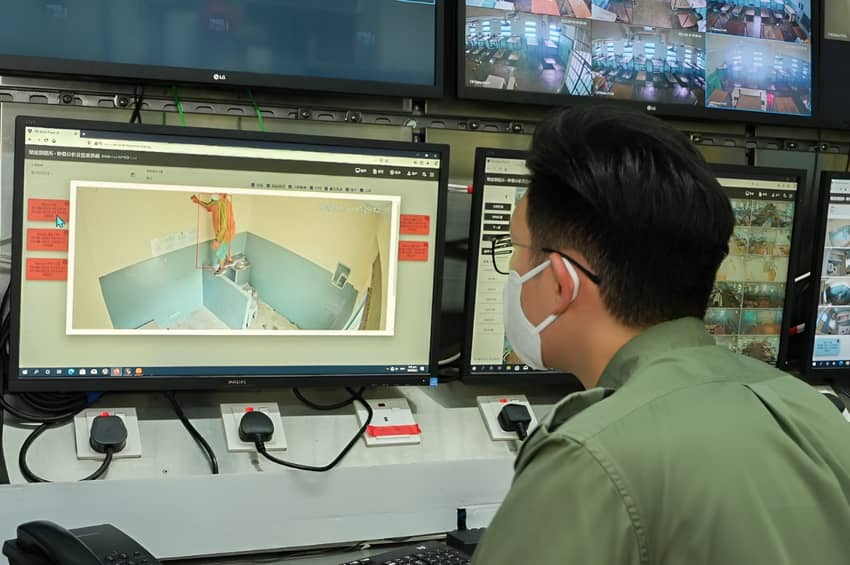
Video Analytic Monitoring System 2.0
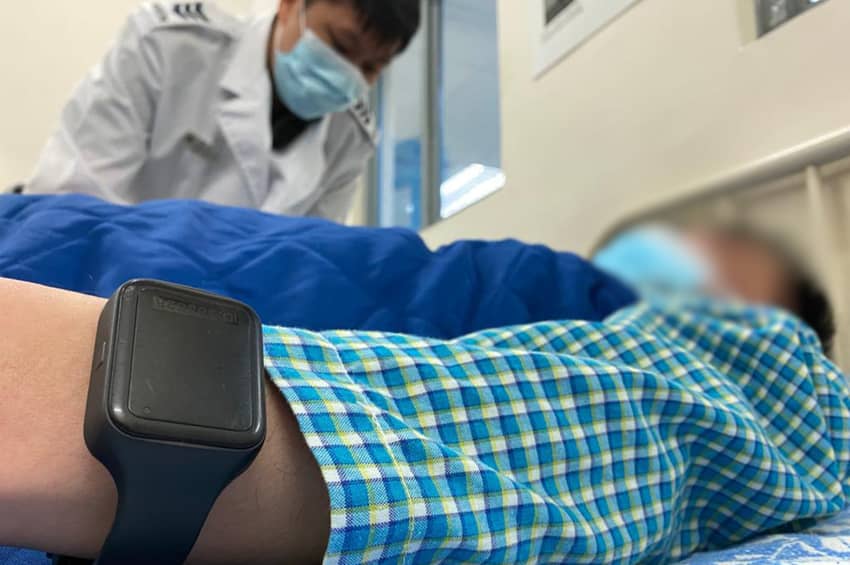
Health Sign Monitoring System 2.0
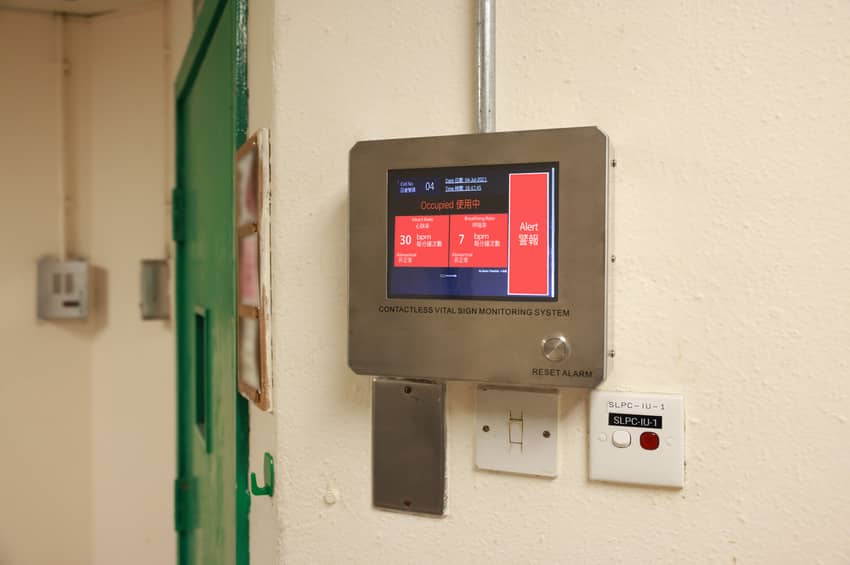
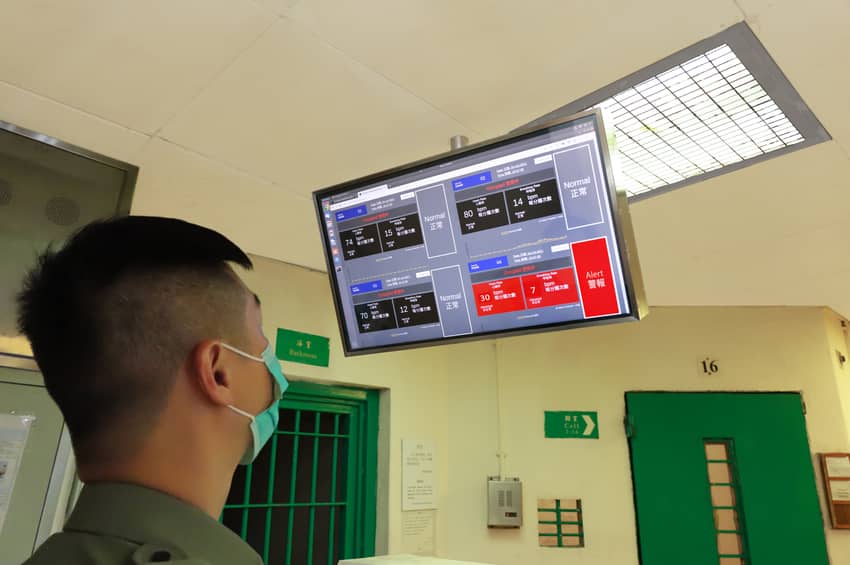
Contactless Vital Sign Detection System
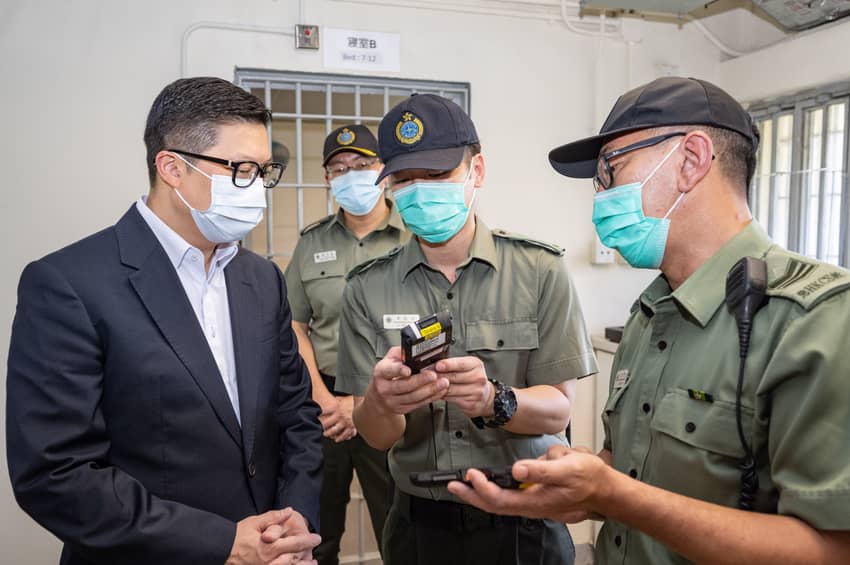
Different stakeholders visit the first-generation Smart Prison at Tai Tam Gap Correctional Institution, including Secretary for Security, Mr Tang Ping-keung, representatives of the Panel on Security of the Legislative Council, and the Honorary Advisor of the Correctional Services Department Staff Training Institute cum Founder of Smart City Consortium, Dr Winnie Tang.
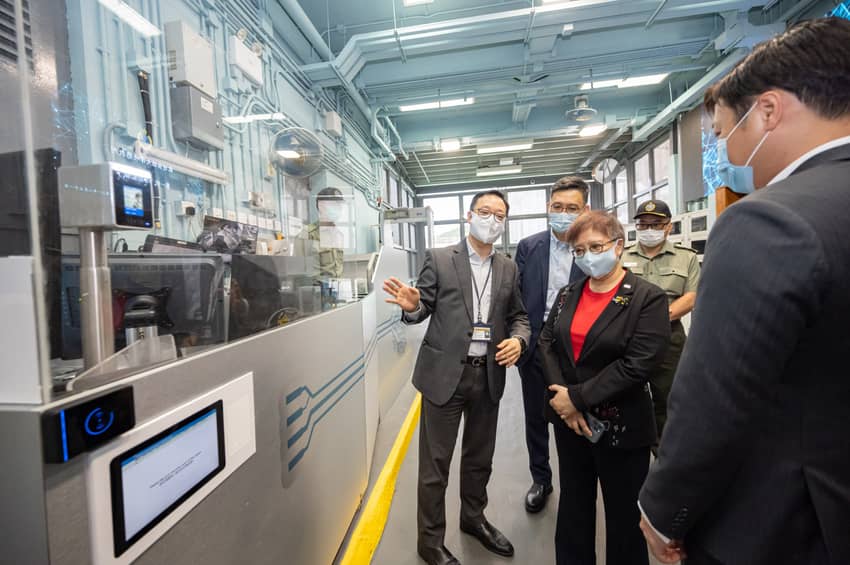
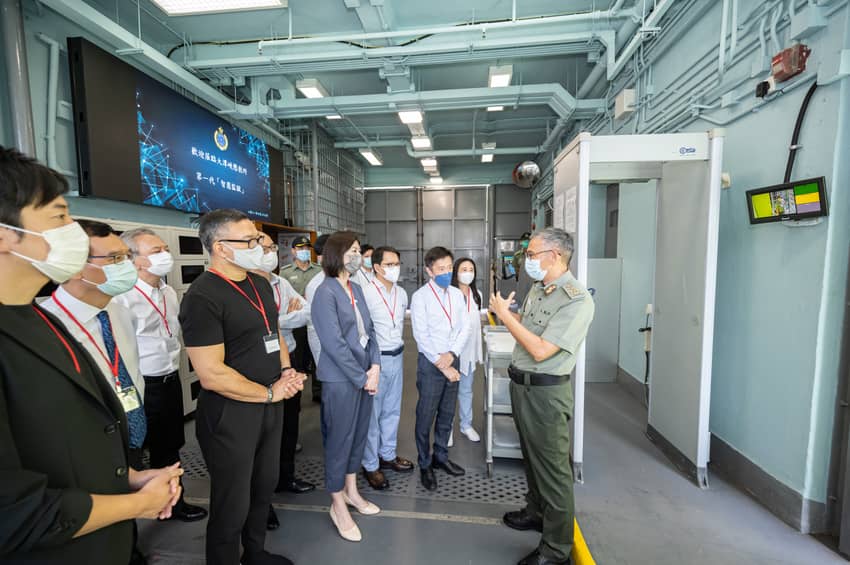
Different stakeholders visit the first-generation Smart Prison at Tai Tam Gap Correctional Institution, including Secretary for Security, Mr Tang Ping-keung, representatives of the Panel on Security of the Legislative Council, and the Honorary Advisor of the Correctional Services Department Staff Training Institute cum Founder of Smart City Consortium, Dr Winnie Tang.


The new generation Video Analytic Monitoring System is awarded a Silver Medal at the International Exhibition of Inventions of Geneva 2021.
The Department is not only proactively developing the Smart Prison protocol, but also willing to share the progress and experience in building the smart prison with external parties, with a view to promoting innovation and technology development in Hong Kong through the concept of wisdom sharing. For example, on invitation of the United Nations Asia and Far East Institute for the Prevention of Crime and the Treatment of Offenders, the Department delivered a keynote speech at the 39th Public Lecture on Criminal Justice Policy held on 29 January 2021 through an online platform to share the development of “Smart Prison”. Over 300 representatives from judiciaries and universities of 26 countries and regions participated in the seminar that day.
Arranging for Persons in Custody to Vote
The 2021 Legislative Council General Election held on 19 December 2021 is the first large-scale election following the improvements to the electoral system. On the polling day, respective dedicated polling stations were set up in correctional facilities to allow eligible electors in custody to exercise their civil rights to vote. To ensure smooth polling arrangements and procedures, in addition to making sufficient preparation before the polling day, including disseminating election information provided by the Registration and Electoral Office to electors in custody, correctional officers also stood fast at their posts on the polling day to arrange for the electors in custody to proceed to the dedicated polling stations to cast their votes in an orderly manner. The voter turnout rate stood high at 48.8 per cent.
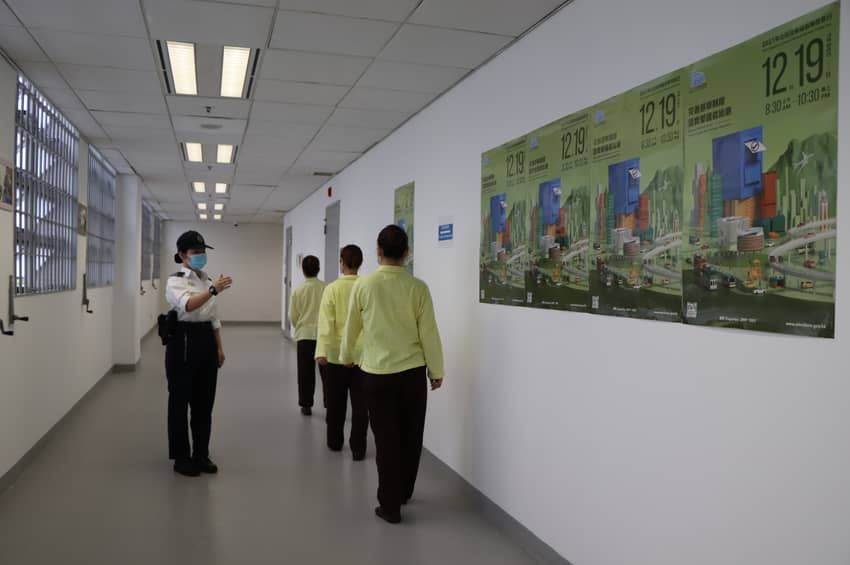
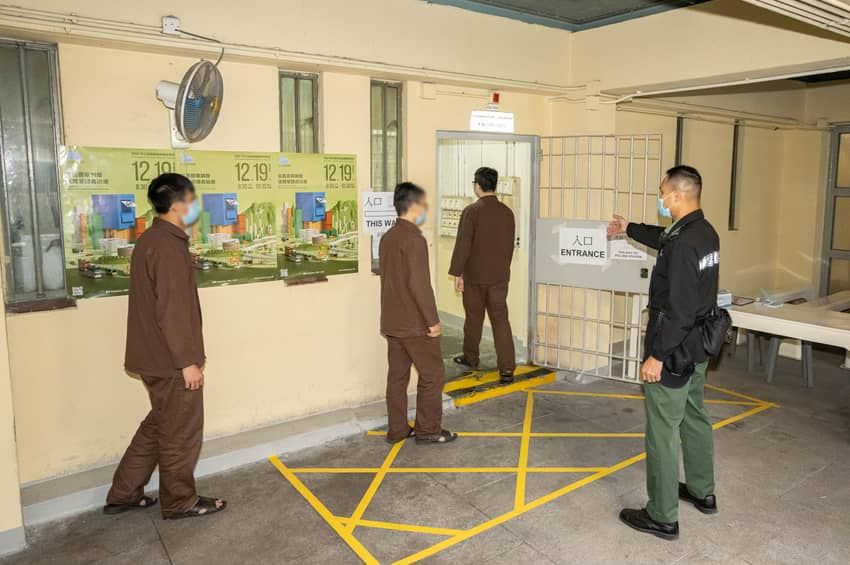
Under the arrangements of correctional officers, eligible electors in custody proceed to the dedicated polling stations inside correctional facilities to cast their votes.
Medical Care for Persons in Custody
There are on-premises hospitals staffed by qualified personnel in all correctional facilities where round-the-clock basic health care services are provided with the support of the Department of Health (DH). Persons in custody at the Siu Lam Psychiatric Centre are attended to by visiting psychiatrists from the Hospital Authority (HA). Besides, visiting medical specialists, such as dentists, surgeons, orthopedic surgeons and ophthalmologists from HA or DH provide regular consultations to persons in custody.
The telemedicine consultation service has been introduced for over 7 years since June 2014. Upon discussion with the CSD, HA approved the regularisation of the psychiatric telemedicine consultation service in August 2018. Apart from Castle Peak Hospital under HA, the service has been extended to the West Kowloon Psychiatric Centre, North District Hospital and East Kowloon Psychiatric Centre. Later, in 2020 and 2021, the service was further extended to the Western Psychiatric Centre, Queen Mary Hospital, Pamela Youde Nethersole Eastern Hospital, Yung Fung Shee Memorial Centre and Queen Elizabeth Hospital (Medicine). The installation of telemedicine consultation facilities has been extended from Lai Chi Kok Reception Centre to Tai Lam Centre for Women, Lo Wu Correctional Institution, Hei Ling Chau Addiction Treatment Centre and Stanley Prison. Shek Pik Prison is the latest one installed with telemedicine consultation facilities, with the installation work completed in 2020.
The Department will continue to work closely with HA to consider the feasibility of extending the psychiatric telemedicine consultation service to other specialist departments. Besides, the Department will actively consider equipping other correctional institutions with telemedicine consultation facilities, with a view to further relieving the strain on the manpower resources required for medical escort duties and reducing security risks.
Regional Response Team
Apart from tackling emergencies within institutions and supporting institutional management to combat collective illicit activities by persons in custody, the RRT has conducted numerous escorts involving high-risk persons in custody and stepped up patrols in the peripheral areas of institutions following the promulgation of the Hong Kong National Security Law.
Having reviewed its operational needs, the Department has introduced new equipment such as the gun type pepper jet launcher and lightweight anti-stab vest for use by the RRT, with a view to enhancing the emergency preparedness of the well-trained RRT for more effective crisis management.
In addition, the RRT and other law enforcement agencies held a series of joint anti-riot drills at Chi Ma Wan Correctional Institution and the temporary training base at Cape Collinson Correctional Institution in 2021 to enhance the communication and co-ordination among different law enforcement agencies and frontline officers as well as their ability in dealing with riots.
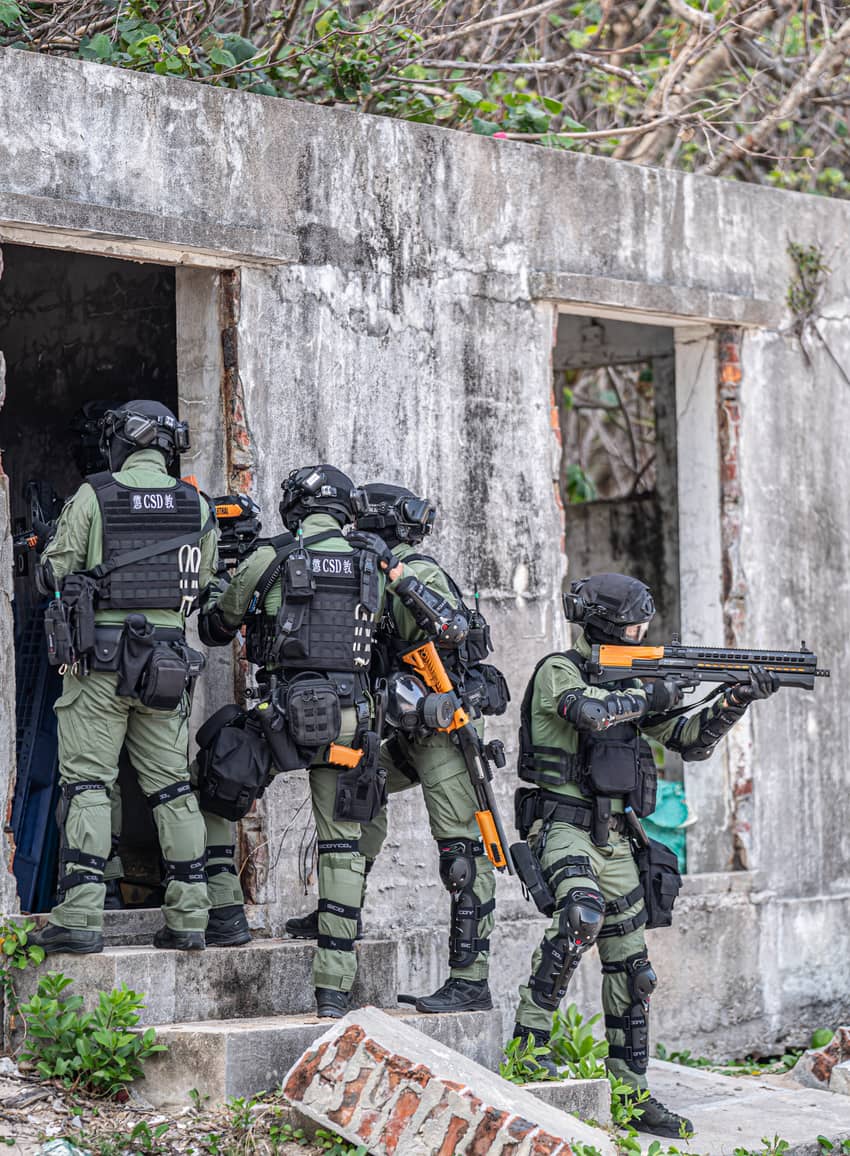
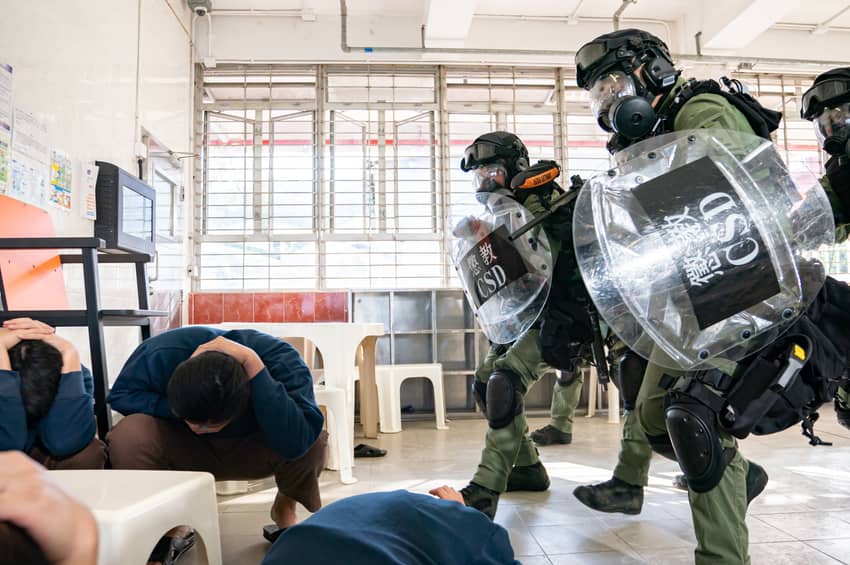
The RRT receives training.
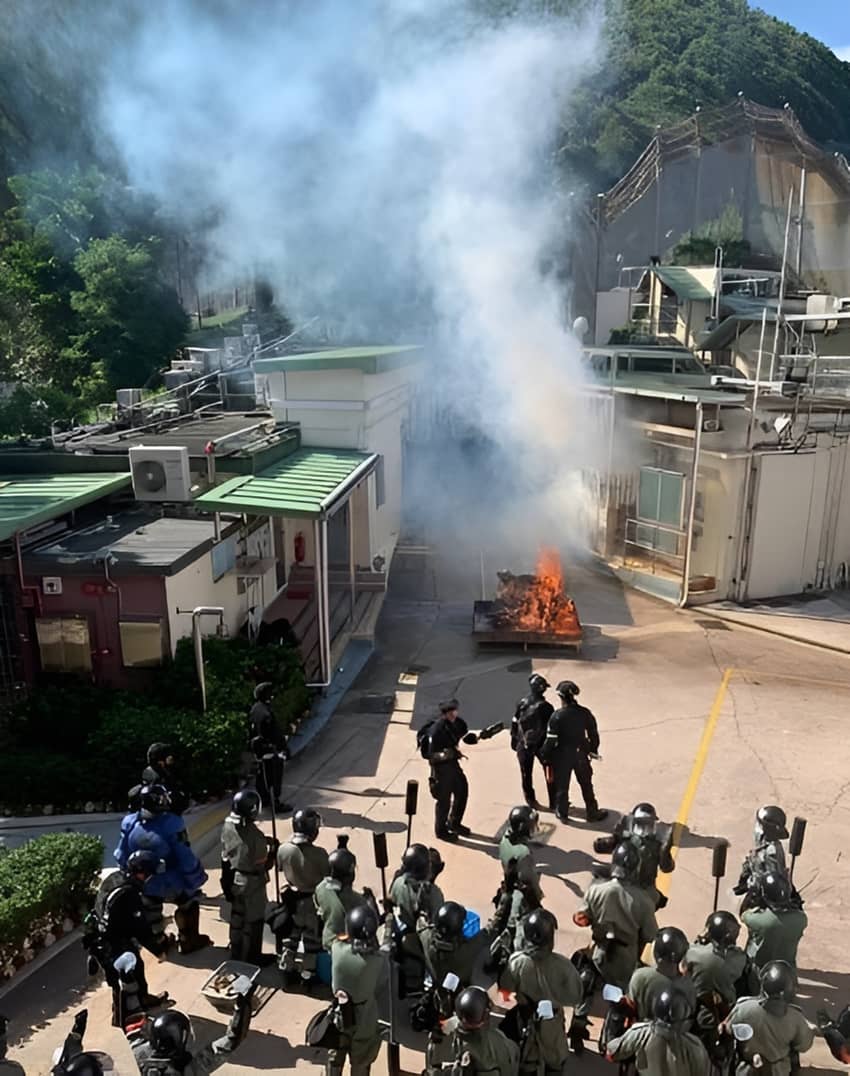
The RRT and other law enforcement agencies hold a joint anti-riot drill in the temporary training base at Cape Collinson Correctional Institution.
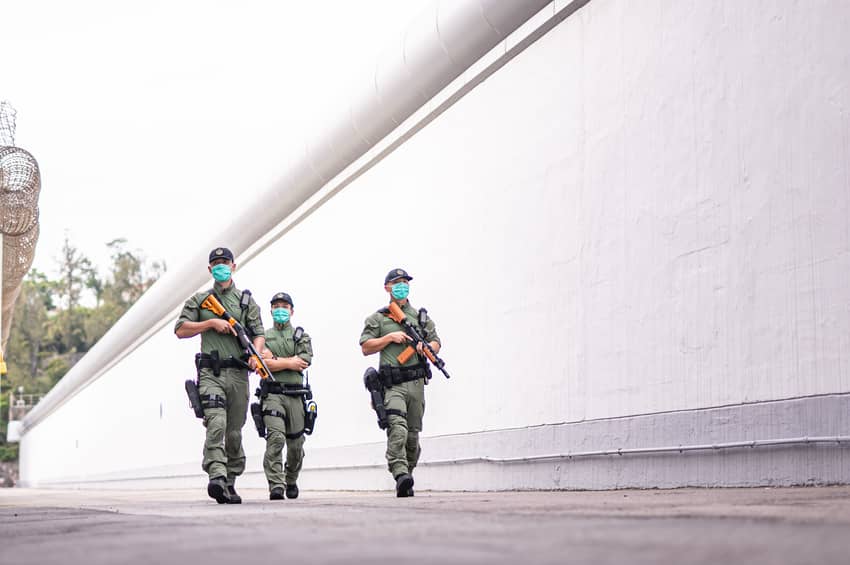
Members of the RRT patrol the peripheral area of a correctional institution.
Dog Unit
Canines are trained by the Correctional Services Dog Unit to carry out patrols and sniff out contraband (dangerous drugs, explosive substances, cigarettes, alcohol and phones) for supporting the surveillance of correctional facilities. There are 5 regional dog teams located on Hong Kong Island and Lantau Island, and in the New Territories, Hei Ling Chau and Lo Wu with a total of 58 working dogs. The Training and Support Team of the Unit is responsible for breeding, raising, training canines, and taking care of sick canines.
Currently, the Dog Unit has 4 breeds of canines, including German Shepherd Dog, Kunming Dog, English Springer Spaniel and Labrador Retriever. They are responsible for duties in different fields. The Department’s working dogs mainly come from the internal “Canine Breeding Programme”. In June 2021, the Dog Unit succeeded in breeding 6 English Springer Spaniel puppies under the Programme to meet future operational needs. The puppies will receive a 12-week basic training when they reach 1 year old.
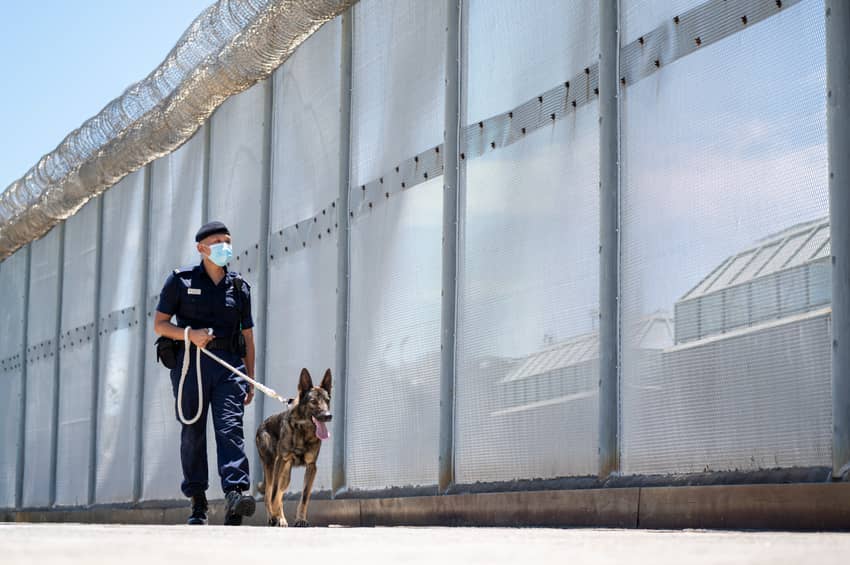
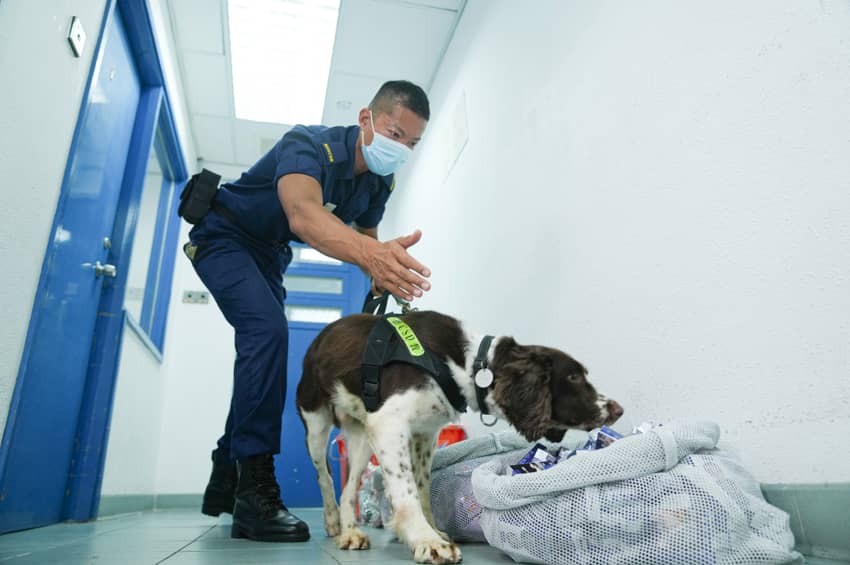
Canines are trained by the Correctional Services Dog Unit to carry out patrols and sniff out contraband for supporting the surveillance of correctional facilities.


In June 2021, the Dog Unit succeeded in breeding 6 puppies under the “Canine Breeding Programme” to meet future operational needs.